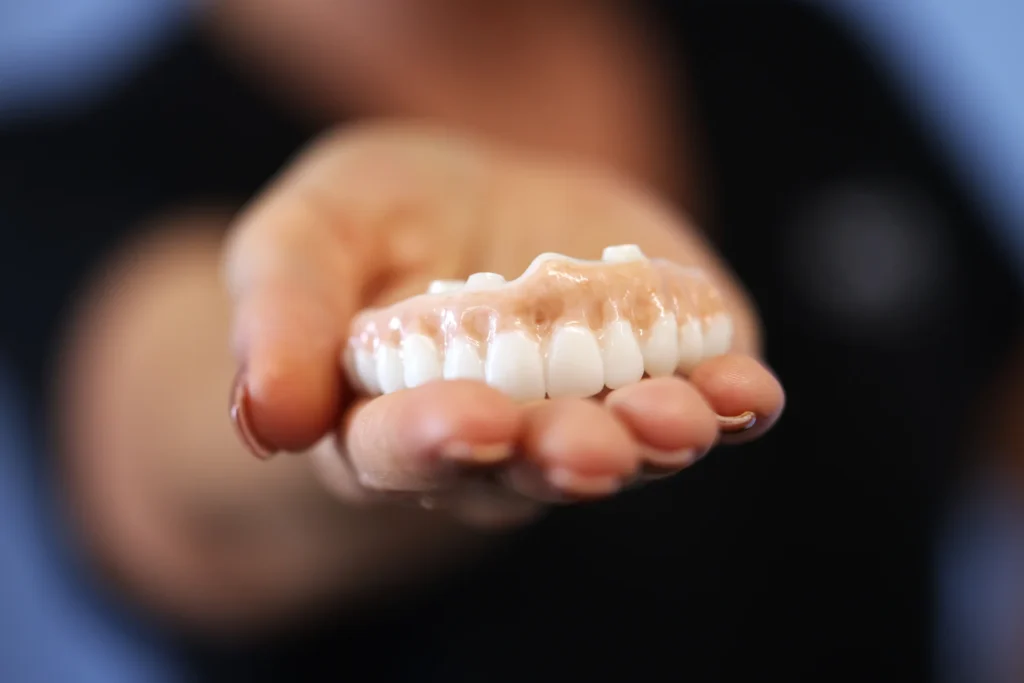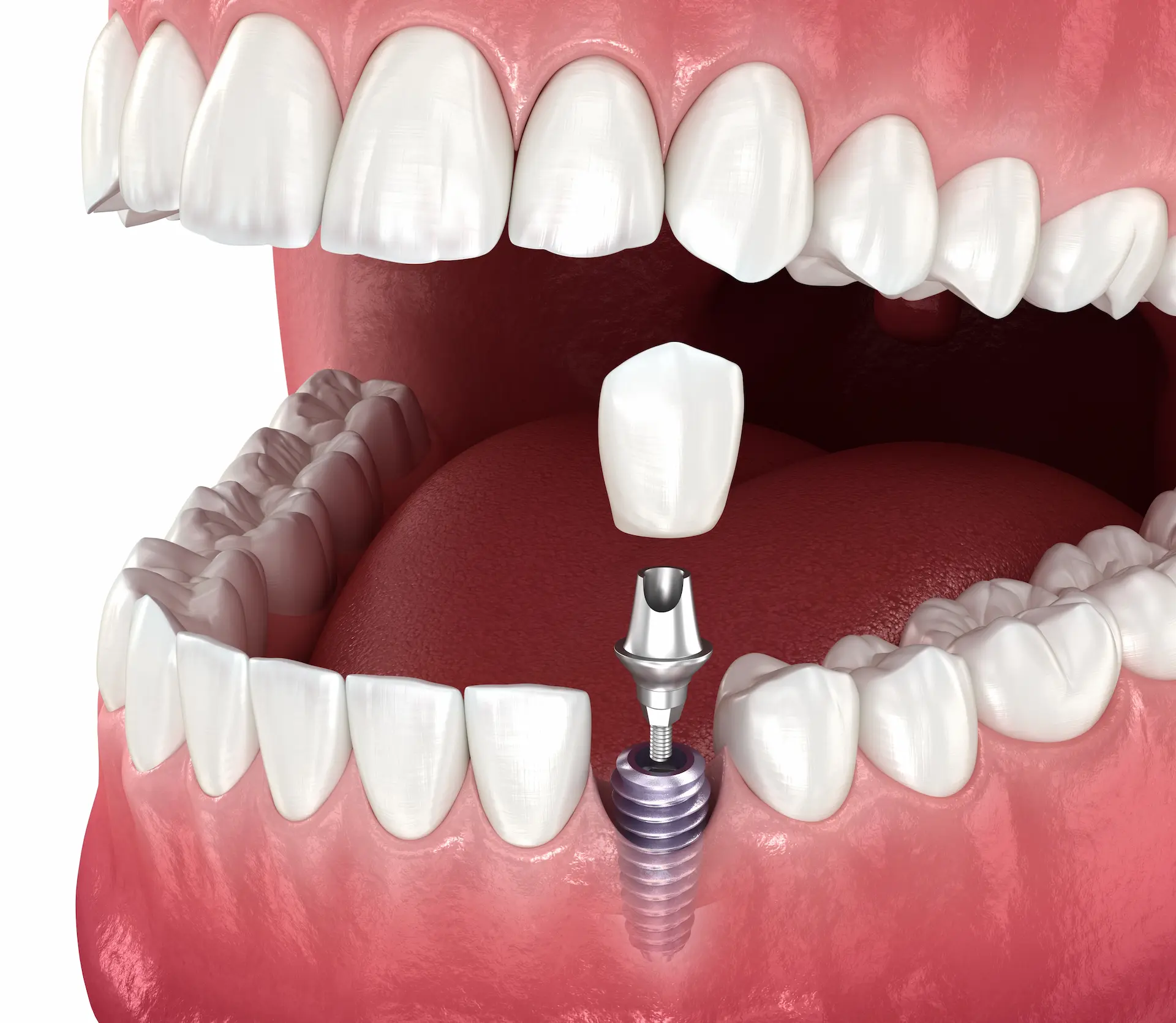When a person loses a tooth due to injury or disease, they may encounter complications such as rapid bone loss, impaired speech, or changes in chewing patterns that lead to discomfort. If this sounds familiar to you, opting for a dental implant can significantly improve your quality of life and health.
Dental implants are a cornerstone in restorative dentistry, offering a natural and durable solution for those missing one or more teeth. Unlike dentures or bridges that may slip or cause discomfort, dental implants mimic the strength and feel of natural teeth. They not only restore the functionality of your teeth but also contribute to a confident smile.
How are dental implants done? Let’s discuss how and why they are done and the process of getting them, from the initial consultation to the final placement, ensuring you have all the information needed to make an informed decision.
Why Are Dental Implants Done?
When a tooth is lost, it’s not just about the visible gap; several underlying problems could begin to surface over time. While implants can help restore your smile and confidence, they can also stave off several issues that could develop over time and save your oral health.
Let’s take a closer look at different ways dental implants can preserve your quality of life and oral health:
- Preserve bone health: Missing teeth can lead to bone loss in the jaw. The jawbone needs the stimulation it gets from the teeth’s natural movements to maintain its density. Without this, the bone begins to weaken and shrink, affecting the facial structure and appearance.
- Preserve alignment: The gap from a missing tooth can cause the remaining teeth to shift out of place. This misalignment can make biting, chewing, and even speaking clearly difficult. It can also lead to discomfort and a higher risk of tooth decay and gum disease due to the harder-to-clean spaces.
- Stable, Comfortable, and long-term replacement: Dental implants offer a solution to these problems by providing a stable and long-lasting replacement that not only looks but also feels and functions like a natural tooth. They help prevent bone loss, maintain the alignment of surrounding teeth, restore function, and bring back confidence in your smile.
Understanding Dental Implant Placement
Making the choice to get dental implants involves carefully planned and executed steps to ensure the best outcome. First, a detailed examination is conducted to assess your current dental situation and overall dental health. At NuSet, this initial consultation is complimentary, and it allows our oral surgeon to clearly understand the type of dental implant treatment plan that will be perfect for you.
Once eligibility is confirmed and the treatment plan identified, we will schedule the next appointment for the actual implant placement.
Here’s a breakdown of the next few steps that follow:
- Preparation of the Site: If the damaged tooth is still present, it is removed. The area is then prepared for the implant.
- Insertion of the Implant: A hole is carefully drilled into the jawbone, and the dental implant body, acting as the new tooth root, is placed. This part is made of titanium, known for its strength and compatibility with the body.
- Healing and Osseointegration: After the implant is placed, a healing period follows. During this period, the implant fuses with the bone in a process called osseointegration. This can take several months, but it’s essential for providing a stable foundation for the new tooth.
- Adding the Abutment: The abutment serves as a connector between the implant and the new tooth. In many cases, the abutment can be placed on the same day as the implant. However, in other cases, it is typically attached in the second visit once the implant site has healed.
- Attaching the New Tooth: The final restoration is attached to the abutment. It’s customized to match the color and shape of the surrounding teeth for a natural appearance.
The entire process, from start to finish, can take a few months, primarily because of the healing time required for osseointegration. However, the result is a durable and stable replacement that looks and functions like a natural tooth.
In many cases, a temporary restoration will be placed over the implant site on your first visit, so that you can walk out of our clinic with a full and complete smile. Once osseointegration has occurred and your implant has healed, you will be ready for your final restoration, which will be your final, permanent teeth to secure both your smile and your confidence.
Types of Dental Implants
There are two main types of dental implants that are commonly used: endosteal and subperiosteal implants. Both serve the same purpose of replacing missing teeth, but they are used in different situations depending on the patient’s needs and jawbone condition.
Endosteal Implants
These are the most frequently used types. They are directly inserted into the jawbone, acting as roots to hold the replacement teeth, and each implant can support one or more of the new teeth. Endosteal implants are typically made of titanium, a material well-known for its durability and ability to integrate with bone.
Subperiosteal Implants
These types of implants are used when the jawbone is not thick enough to support an endosteal implant. Instead of being inserted into the bone, subperiosteal implants sit under the gumline, but on top of the jawbone. A metal frame with a post attached is placed under the gum, which heals around the frame to hold it in place, and the final restorations are then mounted to the posts.
The choice between endosteal and subperiosteal implants depends on the patient’s bone density and overall oral health. We will thoroughly examine and discuss your specific needs and preferences to determine the most suitable option.
What are the Factors Affecting Dental Implant Success?
Dental implants have a 90-95% success rate. Here are some of the key elements that influence the success of dental implants:
Oral Health
Gum disease or other oral health issues can interfere with the healing process and the integration of the implant with the bone. Regular dental check-ups and good oral hygiene are crucial before and after the implant procedure.
Bone Density
Adequate bone density in the jaw is necessary to support the implant. If the bone is too thin or soft, the implant might not have enough support to stay in place. In some cases, a bone graft can improve bone density and make a patient a viable candidate for implants. Our oral surgeons at NuSet have the expertise and skill necessary for these more complex cases.
Overall Health
General health conditions, such as diabetes or diseases that affect the immune system can impact the healing process.
Smoking is another significant factor that can delay healing and reduce the success rate of dental implants.
We always advise patients who smoke to consider quitting smoking to improve their chances of a successful implant.
Aftercare and Recovery
Proper care and recovery after a dental implant are crucial for ensuring its success and longevity. After the implant surgery, it’s normal to experience some swelling, bruising, and discomfort around the implant site. Pain can usually be managed with over-the-counter pain relievers, and applying ice can help reduce swelling.
We recommend sticking to soft foods and liquids for the first few days after surgery to avoid putting pressure on the implant site. Gradually, as healing progresses, more solid foods can be reintroduced into the diet.
Good oral hygiene is vital for the longevity of the implant. This includes brushing twice a day, flossing daily, and using an antibacterial mouthwash.
We recommend regular check-ups. These appointments allow us to monitor the healing process and ensure the implant integrates well with the bone.

What are the Potential Complications and Risks of Dental Implants?
Like any surgical procedure, dental implant placement has potential risks and complications. However, with the help of experienced dental professionals and proper care, these risks can be minimized.
Here are common complications associated with dental implants and how they can be addressed.
Infection
There’s a risk of infection at the implant site. Maintaining good oral hygiene and following post-operative care instructions from your dentist can significantly reduce this risk.
Implant Failure
Although rare, an implant may not properly integrate with the jawbone, leading to failure. Factors like smoking, insufficient bone density, and certain medical conditions like diabetes can increase this risk. If an implant fails, removal is necessary, and another attempt may be made after a healing period.
Nerve Damage
Incorrect implant placement can cause nerve damage, leading to numbness, pain, or tingling in the teeth, gums, lips, or chin. Choosing a skilled dental professional for the procedure reduces the risk of this complication.
Sinus Problems
Implants placed in the upper jaw are prone to protruding into the sinus cavities, leading to sinus issues. Special procedures, like sinus lifts, may be required to avoid this problem.
Despite these potential complications, dental implants have a high success rate. At Nuset, we provide you with the highest quality of care and ensure your peace of mind throughout the dental implant process. With us, you have no cause for worry.

Take the Next Step Towards a Better Smile Today!
Dental implants offer a robust solution for those missing one or more teeth, significantly improving oral health, functionality, and confidence. With their natural look and feel, implants provide a long-term answer that goes beyond cosmetic appeal, helping to preserve jawbone health and maintain the alignment of surrounding teeth.
If you’re considering dental implants as a solution for missing teeth, it’s essential to consult us for personalized advice. We will assess your suitability for the procedure and outline a treatment plan tailored to your needs.
Don’t let missing teeth prevent you from enjoying life to the fullest. Contact us today to take the next step towards restoring your smile and improving your dental health. Your new smile is just an appointment away.
Frequently Asked Questions
How painful is getting a dental implant?
The procedure itself is performed under local anesthesia, so you shouldn’t feel pain during the implantation. Post-surgery, some discomfort, swelling, and bruising might occur, but these can typically be managed with over-the-counter pain medication and ice packs. Most patients report that the discomfort is less than they anticipated.
How are dental implants done step by step?
Dental implants are placed in a series of steps:
- Examination and planning, including X-rays or CT scans.
- Removal of the damaged tooth, if present.
- Insertion of the dental implant body into the jawbone.
- Healing period for osseointegration, where the implant fuses with the bone.
- Attachment of the abutment to the implant post.
- Fitting and securing the final restoration (crown) to the abutment.
How long will it take to implant a tooth?
NuSet offers “immediate load” implants, also recognized as ‘teeth in a day’, which allows qualifying patients to receive their entire implants in just one day. However, the entire process, from the initial assessment to the placement of the final restoration, can take several months.
The most time-consuming step is the healing time required for osseointegration, which can last anywhere from 3 to 6 months. This timeline varies depending on individual healing rates and whether any preparatory procedures, like bone grafting, are needed.
Can a dental implant be done in one day?
In some cases, immediate load implants, also known as same-day implants, are possible. This option allows for the implant and a temporary tooth to be placed in one visit. However, not everyone is a candidate for this procedure. It depends on the quality and density of the jawbone, among other factors.
Where to find a dental implant specialist near you?
You can get dental implants in any of our office and clinic locations near you:
- NuSet Dental Implants and Oral Surgery of St Louis
- 2821 North Ballas Road #225 St Louis, MO 63131 (Inside Town and Medical Building)
- Get driving directions
- NuSet Dental Implants and Oral Surgery of Scottsdale
- 8800 E. Raintree Dr Suite 170 Scottsdale, AZ 85260
- Get driving directions





